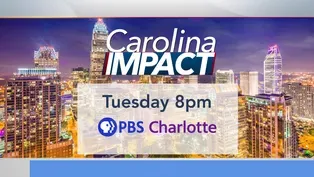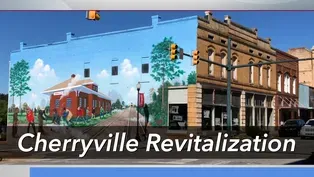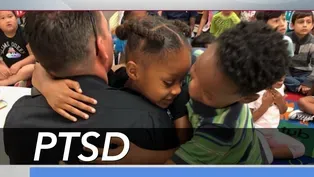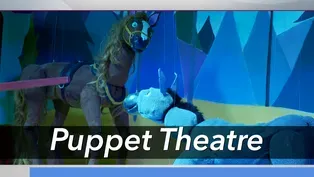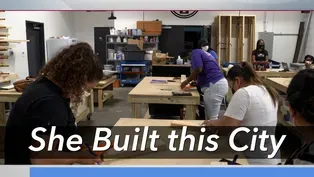
Carolina Impact: October 12, 2021
Season 9 Episode 5 | 27m 7sVideo has Closed Captions
Protesters and police share stories of PTSD, women in plumbing, downtown Cherryville
Hear the stories of protesters and a police officer braving post-traumatic stress disorder following last year's Summer protests.A non-profit in Charlotte trains women to become plumbers in the male-dominated construction industry, and downtown Cherryville undergoes reconstruction to attract new business.
Problems with Closed Captions? Closed Captioning Feedback
Problems with Closed Captions? Closed Captioning Feedback
Carolina Impact is a local public television program presented by PBS Charlotte

Carolina Impact: October 12, 2021
Season 9 Episode 5 | 27m 7sVideo has Closed Captions
Hear the stories of protesters and a police officer braving post-traumatic stress disorder following last year's Summer protests.A non-profit in Charlotte trains women to become plumbers in the male-dominated construction industry, and downtown Cherryville undergoes reconstruction to attract new business.
Problems with Closed Captions? Closed Captioning Feedback
How to Watch Carolina Impact
Carolina Impact is available to stream on pbs.org and the free PBS App, available on iPhone, Apple TV, Android TV, Android smartphones, Amazon Fire TV, Amazon Fire Tablet, Roku, Samsung Smart TV, and Vizio.
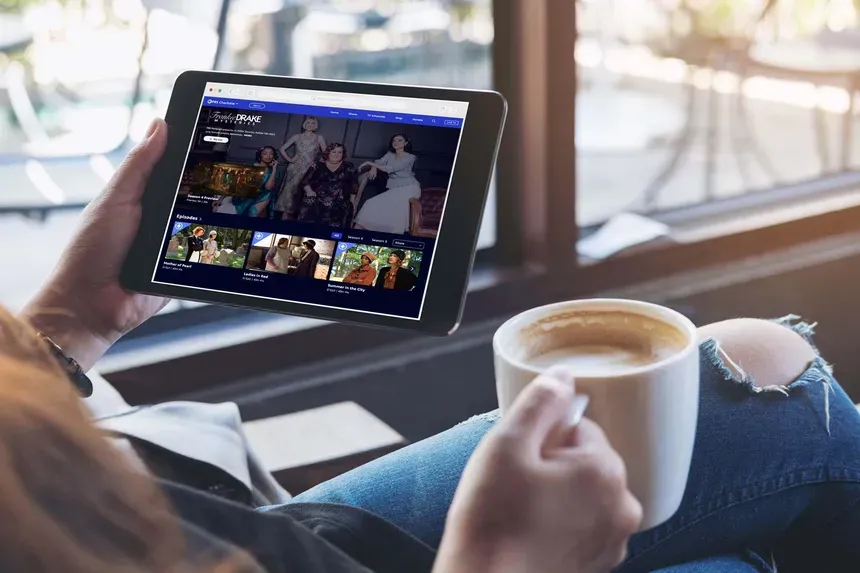
Introducing PBS Charlotte Passport
Now you can stream more of your favorite PBS shows including Masterpiece, NOVA, Nature, Great British Baking Show and many more — online and in the PBS Video app.Providing Support for PBS.org
Learn Moreabout PBS online sponsorship- [Announcer] This is a production of PBS Charlotte.
- Just ahead on "Carolina Impact," more than a year after the 2020 protests, some officers and protesters are still dealing with the psychological after-effects.
How they're coping with PTSD.
Plus... - A lot of changes happening here in downtown Cherryville, not just the changes you can see on Main Street, but also the changes you can't see.
I'm Jeff Sonier, stick around.
We'll show you what's happening behind those closed down storefronts.
- Coming up, we'll take you inside a program designed to train women interested in the construction industry.
I'm Sarah Colon-Harris, meet the students who say they're not afraid to get their hands dirty.
- "Carolina Impact" starts right now.
(dynamic music) - [Announcer] "Carolina Impact," covering the issues, people, and places that impact you.
This is "Carolina Impact."
- Good evening, thank you so much for joining us.
I'm Amy Burkett.
Post-traumatic stress disorder, or PTSD, is a mental health disorder that some people develop after experiencing or witnessing a traumatic event, like a car accident, or physical assault.
Some people are still suffering PTSD symptoms from their involvement with the 2020 Uptown Charlotte protests.
"Carolina Impact's" Jason Terzis talked with two protesters and a police officer about their experiences.
(soft music) - [Jason] The death of George Floyd still serves as a trigger for people around the globe.
His murder sparking worldwide protests in the summer of 2020, including right here in Charlotte.
- It was just very confusing, and you know, chaotic.
- [Jason] The Charlotte protest reached a tipping point on June 2nd.
Chantel Kennedy and Lindsay Curlee were among a group of protesters who say they were boxed in by police.
- Every time I thought that I had gotten a fresh breath, every time I thought that I'd gotten out, gotten free, there was more cops everywhere, with bikes, and guns, and batons.
- [Man] They just chased everybody down this way.
There's a lot of riot police up there.
There's a lot of riot police back there.
- I was thinking, I can't run past you.
I can't turn around and run the other way 'cause police are blocking that way.
- [Jason] Among the Charlotte-Mecklenburg police officers called in for protest duty was Chad Webster, just as he had been in the past.
- This time was different for me because it felt, it just felt like there was so much more hate.
- [Jason] For several weeks, Chad's schedule remained unchanged.
12 hours on, 12 hours off, with no days off.
- I don't know if it was just the perfect storm, but something in me snapped.
- And that's a wrap with The Pigs.
- The Bacon Response Team at Reedy Creek Elementary.
- [Jason] We first introduced you to Chad two years ago, prior to the George Floyd protests.
He and partner, Jason Pete, were a part of CMPD's Community Coordinator Program.
Their job wasn't to respond to 911 calls, or issue traffic tickets.
But instead, get to know the people who lived and worked in the University City area, read to kids at schools, and hopefully lessen the divide between officers and the community.
- We signed up to help people.
And here's a kind of a different, unique perspective of two guys that are cops.
- [Jason] Chad even authored a couple of children's books.
- I guess it's a kind of unique thing, where you hear about a police officer that writes children's books.
- [Jason] But when the protest began, Chad was pulled from his community coordinator role and put right into the middle of Uptown.
- I had spent all these years trying to let's look at things a little differently, and I'm trying to make positive differences.
I'm not trying to just lock people up, and write tickets, and things like that, to be treated on the front line like I was some sort of hateful person.
- Some of the same officers that were injured during the riots, that were getting rocks, and frozen water bottles, and fireworks blown up in their face.
Some of those same officers are the same ones that are out in the communities doing great work, that are helping our youth and steering people in the right path.
And that really care about the community.
- [Jason] Chad served on the CMPD for just under 20 years.
He'd seen unsettling things before.
But for whatever reason, he simply couldn't put the emotions of what he experienced this time behind him.
- I just wasn't mentally right after it happened.
- It wasn't until a few weeks after the riots that he just was having crazy nightmares, and night sweats, and panic attacks.
- I wake up unable to breathe.
I'm soaking wet from night sweats.
I'm afraid to be around groups of people.
- [Jason] He tried going back to work, but just couldn't do it.
Using up all of his vacation and sick days.
Even taking unpaid time off.
- Baffling that it could be, from so quick of a decline.
- [Jason] Chantel and Lindsay have had similar experiences.
They're part of a class action lawsuit accusing CMPD of willfully trapping and ambushing protestors.
- [Man] We're trapped.
They're shooting pepper balls at us.
- I was having nightmares.
I could not sleep with the lights off.
I still can't, I have a nightlight now.
- I just don't trust the police.
I feel anxious when the police are riding behind me.
- I mean, I think about it regularly.
If there's a cop that passes me on the road, I wonder if they're one of the ones that were shooting at me and gassing me that night.
- [Jason] What each of them is experiencing would be best described by health professionals as post-traumatic stress disorder, or PTSD.
- It's your system, it's your window to what you can tolerate, what you can manage.
- [Jason] Bernadette Christi is a licensed clinical mental health counselor, specializing in trauma.
She says most people react in one of two ways when a major incident occurs.
Either by taking it head on, or by getting away from it.
It's known as fight or flight.
- It's not the event that creates the trauma, but it's the body's response to the event that creates the trauma.
When you have a trauma, you're stuck in fear.
And so the body is feeling fear everywhere.
Looking for fear everywhere, danger's everywhere.
But it's really coming from the inside because it's the body that has the trapped feelings of fear from that incomplete fight or flight.
- And he has every symptom that there is for PTSD.
- [Jason] But perhaps the biggest challenge in dealing with PTSD is the stigma that's sometimes attached to it.
- If you say, I don't feel right after I saw this bad thing, it's looked at as a weakness, or what what's wrong with you?
Why are you having trouble?
I'm fine over here.
- Really just kind of felt brushed aside by lots of people close to us because they just were like, well, he'll get over it, he's a strong guy.
We know him, it'll be fine.
And it wasn't fine.
And it's still not fine.
- [Jason] To help heal and eliminate reminders of the past, Chad took an early retirement from the CMPD, and has since moved with his family to the beach.
He, as well as Chantel and Lindsay, are trying to continue their journey of moving forward, and past the reminders of a tumultuous year.
- Jason joins me in the studio now.
And Jason, let's talk a little bit about how common is PTSD?
- Health officials say that PTSD happens with roughly 7% to 8% of the general population.
And the number one thing that happens is car accidents.
People get involved in a car accident.
We're in our cars every day.
You're never really thinking about it until it happens to you.
And all of a sudden you're in this situation where something happens and you're in a car accident.
And for a lot of people, it's just, it's hard to get away from.
It's hard to not relive those seconds, and that minute where it happens, and then the aftermath, and everyone's shaken.
That's the number one cause that kind of gives people recurring thoughts, nightmares, whatever the case may be.
- When we talk about PTSD, we often think of military or police officers, but you're saying car accidents is number one.
But let's go back to police officers.
Are there programs within departments that can help their officers deal with the potential of this?
- Yeah.
And so if we say 7% to 8% of the general population suffers PTSD at one point or another during their lifetime, with police officers, those numbers are doubled.
It's 15% plus.
And it probably is even higher because a lot of it is unreported.
It's the macho world of law enforcement.
And a lot of times officers might be less willing to say, you know, I'm struggling.
So at CMPD, officials say that the department does have several programs related to officer wellness, in addition to a full-time department psychologist.
There's also peer support networks.
And I would imagine that most departments across the country, especially in today's day and age where mental health is becoming so much more in focus, I would imagine almost just about every program or police department has some sort of program.
- Jason, thanks so much for shining a light on it.
We really appreciate it.
- Absolutely, my pleasure.
- Here in the Carolinas, going downtown in a small town is often like stepping into a scrapbook.
Lots of old stories to share.
And main street memories of what it used to be like.
But, the challenge for a small town like Cherryville, in Gaston County, is reconstructing downtown to attract new businesses.
"Carolina Impact's" Jeff Sonier is in Cherryville, on Main Street, where moving forward also means remembering where you've been.
- Yeah, Cherryville's downtown dilemma, like a lot of other small town downtowns.
How do you replace that old department store on Main Street, or the closed down movie theater, or maybe that big bank building on the corner?
Well, here in Cherryville the answer is, you do it one storefront at a time.
♪ I just wanna know ♪ Would you go ♪ Would you go downtown - This building had a new facade put on it.
This building had a new facade put on it.
- [Jeff] David Day is a former pastor, now preaching the virtue of resurrecting what remains of Cherryville's historic downtown.
- Right now we've got one, two, three, four, five, six that's gonna be redone.
- Wow.
- And another one that's already finished.
- [Jeff] Walking the downtown sidewalks.
- Yeah, this part of downtown has had probably most of the most exterior and interior work done.
♪ I just wanna know ♪ Would you go ♪ Would you go downtown - [Jeff] Day showing us the Downtown success stories, like Downtown's new Butter Me Up bakery.
- Apartments upstairs, downstairs is the bakery.
And in, now in the next couple of weeks gonna be a tea room in the back.
We also have the iconic pink building here, that used to be a movie theater.
- [Jeff] What is this down here, just by the way?
- This is the Children's Art Alley.
This was just a vacant alley that nobody used, and nobody had anything to do with, the city owned it.
So it made a perfectly good sense to take something and revitalize it, make it fresh and new.
♪ I just wanna know ♪ Would you go ♪ Would you go downtown - [Jeff] Cherryville's downtown director also stops at the Downtown storefronts where there's still work to be done.
- We have buildings, like this one right here to my right, that were actually going to be renovated.
They're in the process of repairing this wood.
So a lot of the stores Downtown we're trying to repurpose, and keep the history of the building.
(twangy music) - [Jeff] You can see that history in these old photos of what Downtown Cherryville used to look like.
But more changes are coming, as they re-imagine Downtown.
The iconic old BB&T Bank building will be a new brewery, restaurant, and coffee shop.
And here's another Cherryville work in progress, the old Main Street Belk store.
- The outside's not quite done yet, as you can see, but it's going to be great.
And it's gonna be so beautiful Downtown.
- [Jeff] Belk was a downtown destination for decades.
But the old sign and the old shoppers are gone now.
The Main Street storefront is boarded up and barely recognizable.
- [Vickie] Okay, so we're coming in the rear of the building, from the alleyway.
- [Jeff] But Cherryville real estate agent, Vickie Spurling, takes us through the back door of the old Belk department store for a tour of what's going on behind all that plywood out front.
- This side of the building, and we just entered from the rear.
This side of the building has five offices.
There's two here, three on this side.
And there's a door between, so you could have, you can rent two offices, or one.
- Okay, and then farther down here.
This is the old first floor of the old Belk department store.
- The old Belk department.
This was the ladies department.
- And over here?
- On this side, we have retail area.
- So this old retail store will have retail in it again.
- We're hoping so.
It'll be very nice to have, Belk's had shoes, clothes, men's clothes, ladies clothes, a store similar to that we would love to have.
Of course, on a much smaller scale.
- How much of a difference is this gonna make for downtown Cherryville?
- Well, I mean, we're hoping that it'll make a huge difference.
We've already renovated one building, and it has made a lot of difference in town.
We're thinking that if we bring living space downtown, then we're gonna have people downtown all the time.
- [Jeff] Yup, there's actually living space on the second floor of this old department store.
- Upstairs to the apartments.
- Apartments.
Above an old department store.
- That's right.
- [Jeff] This is one of the apartments here?
- This is one of the apartments.
This is a two bedroom unit.
And of course you can see we left it exposed.
- [Jeff] These lofts with vaulted ceilings still have the original rafters visible.
There's also exposed brick on the walls, and the windows are tall, with views from this historic building to Cherryville's other historic buildings on Main Street.
- Well, you get a good view of downtown, there's people walking and sitting on benches.
You can see all the flowers that we planted.
There's a building across the street that's been renovated.
The one across the street says 1913.
Most of it's still old buildings.
So this gives you a great view of the museum across the street.
- [Jeff] Plus, well, here's a surprise.
This old ghost sign from 1912, that workers discovered under the second floor Belk store plaster, on what was the outside wall of FC Carpenter's Restaurant and Soda Fountain, back then.
Now it's the inside wall of this future Cherryville apartment, and another peek into Cherryville's past.
- That'll always be the Belk building.
So we're changing parts of it, but we're keeping the history of it to make it as important as we can.
(band drumming) And we'll close Main Street, and have a huge parade in town to celebrate our high school, which is a very important part of the town.
But those kids are the ones who will be graduating college in five years.
And either they'll come back here to live, or they won't.
(upbeat music) If you don't grow, you die.
And you know, our city has a vision for itself.
And we are finding our own niche, and what makes us who we are, what we're proud of, our history.
Things don't blossom without roots.
So we've got strong roots in Cherryville.
We're just adding some new blooms to what was there, the foundation, where it's still Cherryville.
That we don't lose our character.
- And lots of other changes coming here to downtown Cherryville that you can't see.
They're actually putting in new water and sewer behind these Main Street storefronts.
And pretty soon new sidewalks also coming to Main Street.
The city of Cherryville investing in its downtown, hoping that businesses will invest too, Amy.
- Thanks so much, Jeff.
We've got a link to more about Cherryville's changing downtown district on our website, pbscharlotte.org.
Click on the walk down main street button for a peek inside all those downtown Cherryville shops and restaurants.
Well, construction has traditionally been a male dominated field.
As more and more people reconsider their career paths following the pandemic, new opportunities are emerging.
Now, the construction industry is seeing an increase in women hires.
Sarah Colon-Harris has more on an organization working to train women plumbers.
(drill whirring) - [Sarah] Drilling, drawing, testing, women learning using a little muscle.
For Sandra Marquez, the hands-on experience signals hope and opportunity.
- In my family, we have strong women.
So I was like, hey, if I have the opportunity to learn something new and something that would usually only men do it, I wanna go ahead and do it.
- [Sarah] Sandra, one of eight women participating in a free pre-apprenticeship program created by the nonprofit She Built This City.
In the span of 15 weeks, the group will learn the ins and outs of plumbing.
A skill Sandra says will benefit her husband's construction business.
- Maybe we can do it together.
So far, I think everything has been great for me.
But I think learning things that usually we don't know, like reading the tape measures, and know the size of the pipes, and all of that, is something I think it's one of my favorite parts.
- The program focuses on three areas, the mind, the heart, and the hands.
By focusing on the mind, students get the information they need.
By focusing on the heart, they're able to articulate their passion.
And of course, by using their hands, they get the practical experience they need to be successful.
- We teach them about the various types of pipes, PVC, copper, PEX.
We teach them about drills.
So it's tools, fittings, measurements.
How to measure using a tape measure.
How to calculate waterflow, volume.
The specific technical things.
- [Sarah] The women also learn how to deal with the resistance that can come with working in a male dominated industry.
- Women are not considered, not the same physical strength.
So those are some of the things you're prepared for, prepare for the pushback, whatever form it may take, right?
So you have to have a sense of yourself and ask questions.
- [Sarah] Women make up about 12% of workers in the trade industry.
Of those, about 3% actually do hands-on work using tools.
The remainder work in administrative roles.
- We're trying to change though, the image and the experience of women in this space.
- [Sarah] As the executive director of She Built This City, Latoya Faustin works to ignite interest in the trade industry among women and girls.
And while she loves the work, she's not naive to the bias women often face on the job site.
- I was on a podcast last week.
And they were saying, women don't wanna do dirty jobs.
I'm like, who don't wanna do a dirty job?
You know what the most dirty job is?
Being a mother, childbirth, cleaning up vomit.
So don't tell me that women don't wanna do dirty jobs.
We do them, whether we get paid or not.
So why not get paid to do it well.
- With me cooking, I get my hands dirty often.
So for me, that's just a part of the job.
(laughs) - [Sarah] Like many people during the pandemic, Hatisha Mike's catering business took a hit.
The downturn opened the door to try a new skill.
The decision paid off.
Eight weeks into class, and she's already secured a job in the plumbing industry.
- I started a job today.
And once I leave the program, my goal is to obtain my master plumbing license.
Once I obtain my master plumbing license, I want to start a business so that I can have others work under my license.
- [Sarah] Right now, construction workers are in high demand.
National numbers reveal the industry will need to hire 430,000 workers this year, and 1 million more over the next two years to keep up with the pandemic shortage.
Many companies forced to up their wages.
Faustin says, plumbers make an average of $56,000 a year without a four-year degree.
- Apprenticeships, the trades, they pay you to learn.
You can make 15 to $17 an hour just to learn.
That's not even doing the work, it's go to class.
That's not what the traditional American dream of going to college and getting in debt says.
We're trying to provide another pathway and opportunity for women to support them and their families.
- [Sarah] She Built This City also creates hands-on workshops to spark interest among middle and high school girls.
- Go into the schools, or we go, we bring them here to our workshop, and we literally build things with them.
Like for instance, there's a toolbox over there that we build with them.
We go to all of the parks and rec centers this summer.
We covered literally all of them, doing a workshop.
Anywhere from five-year-olds, to 10, 11, 12 year olds.
- [Sarah] The goals, simple.
- Job choices, female empowerment, are both of our goals.
- [Sarah] Empowering both women and girls to challenge the norm, one nail at a time.
For "Carolina Impact" I'm Sarah Colon-Harris reporting.
- Thanks so much, Sarah.
To learn more about She Built This City's next pre-apprenticeship program, visit pbscharlotte.org.
Well, the art of puppetry has been around for thousands of years.
The Columbia Marionette Theatre, founded in 1988, uses puppetry to educate as well as entertain crowds.
When we visited, they were performing a musical called "The Bremen Town Musicians" based on a Grimm's fairy tale.
"Carolina Impact" photojournalist Russ Hunsinger takes us on a one tank trip to Columbia, South Carolina, to follow the adventures of a donkey, a rooster, and a cat, headed to the town of Bremen.
(donkey singing) - [Russ] Marionette is a type of a puppet.
It's a puppet that's on strings.
♪ Pull a string ♪ And I'll wink at you ♪ I'm your puppet - Well, when you walk in, the first thing you're transformed into this whole different reality almost, with just puppets, and characters, and bright colors everywhere.
So it's gonna be a lot for the eye.
Our shows are very interactive, with not just the kids, but with the adults.
We try to throw in humor for the adults to enjoy.
♪ You've got full control of your puppet ♪ - They look like they were kinda like moving in real life and they were real.
- I was the donkey a little bit.
I also had my hands on the cat and the rooster.
I think that performing with puppetry is really magical because you're bringing something to life from the ground up.
Without your performance and without your interaction, this object would be dead.
So you're really, you're like breathing breath into it.
And I think that's really magical.
- [John] They all have a life of their own.
The art form of puppetry is to bring that inanimate object to life.
That's where the absolute art of puppetry comes in, is when you forget about the strings, you forget about the puppeteer, and you just buy into the character, and the story that they're trying to relate to you.
♪ I'm going down the road - What makes this art form unique now, is we're relying on physical objects, and we're not sitting you down in front of a screen and putting a movie on.
- I liked when the donkey started singing the song and he encouraged the other animals to do it.
- It's interactive.
I feel like it's on their level and they learn.
And it's quick and short for their attention spans.
- My favorite animal was the rooster.
- [Rooster] We're almost there.
- One of the tricks to working these is you don't wanna drag it on the floor, but you do want to get it just enough to clip back and forth, and walk so it looks like it's walking like a real dog.
The strings right here, make the ears go up and down.
Then this string here, when you lean him forward or backwards, it makes his mouth open and close.
- This guy right here is a puppet intended for a Greek myth, Jason and the Argonauts.
And this guy is a much smaller scale because he's meant to be performed on a tabletop.
- These guys build beautiful puppets, and it's been a real joy to have the creative freedom to do so many fun costumes, work with so many great fabrics.
These guys, when they sketch out puppets, sometimes their ideas are very practical.
Sometimes they are completely outrageous.
And it's the outrageous ideas that I have a lot of fun trying to create and design for.
- [John] There's dozens of props and dozens of puppets in each show.
We record all of our soundtracks, and do all of the music and the sound effects.
Everything is original.
We do our own voices.
- One thing that I love about puppetry is that it really uses a whole bunch of different artistic skills.
So if you are musically inclined, your puppet show needs music.
If you like to draw, well you need to design the sets.
If you like to sculpt, well there's making the puppets.
If you like to act, they need voices.
It encompasses all of these different artistic disciplines.
And as a puppet maker and puppeteer, you get to tap into all of those.
I think puppetry is doing well right now.
I think that it has proved that it's a timeless art form.
And it looked for a minute like movies, and TV, and all that stuff, weren't gonna need puppets anymore, 'cause now computer graphics could solve everything.
Nothing replaces like having a physical thing there.
And now, movies and stuff are going back and going like, oh no, we actually built that, we made that puppet.
And that's like a bragging point, that things are actually still being constructed.
♪ Just pull them little strings ♪ ♪ And I'll sing you a song ♪ I'm your puppet - [John] Every little piece represents something that someone has done with their hands.
And then it goes on from there.
Once you have a complete cast of characters, and you have a set, and you're ready to go, it's still people manipulating these things, and moving these things with their hands.
And everything is happening right there in front of you.
And you're expecting your audience to take that journey with you, go to another place, and escape off of their bench, for a while.
(puppets chattering) - Thanks so much, Russ.
The theater also offers field trips for students to get a behind the scenes look and hands-on experience with the marionettes.
Well, that's all the time we have this evening.
Thanks so much for joining us.
We always appreciate your time.
And look forward to seeing you back here again, next time, on "Carolina Impact."
Good night, my friends.
(upbeat music) - [Announcer] A production of PBS Charlotte.
Carolina Impact: October 12, 2021 Preview
Preview: S9 Ep5 | 30s | Protesters and police share stories of PTSD, women in plumbing, downtown Cherryville (30s)
Video has Closed Captions
Clip: S9 Ep5 | 6m 12s | Downtown Cherryville undergoes reconstruction to attract new businesses. (6m 12s)
Video has Closed Captions
Clip: S9 Ep5 | 5m 34s | Police officers and protesters dealing with PTSD (5m 34s)
Video has Closed Captions
Clip: S9 Ep5 | 4m 40s | A theatre company delights children and adults through the art of puppetry (4m 40s)
Video has Closed Captions
Clip: S9 Ep5 | 4m 48s | A non-profit in Charlotte trains women to become plumbers and construction workers (4m 48s)
Providing Support for PBS.org
Learn Moreabout PBS online sponsorshipSupport for PBS provided by:
Carolina Impact is a local public television program presented by PBS Charlotte
